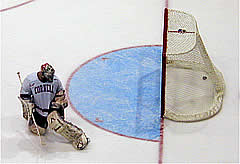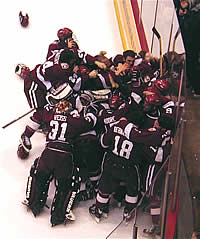Harvard sophomore winger Tyler Kolarik’s goal was possibly the most important overtime winner for the Crimson since Ed Krayer netted the game-winner against Minnesota to win the 1989 NCAA Championships.
Maybe earning the Whitelaw Trophy is not quite as prestigious as bringing home the national championship banner, but for Harvard coach Mark Mazzoleni and his squad, the ECAC Championship is a start.
And picking up the 4-3 win over Cornell? Well, that was just icing on the cake.
As the rivals approached the end of the second overtime period, Kolarik caught a characteristic burst of energy and put an end to the longest championship game in ECAC history.

Kolarik gained control of the puck off a pass from sophomore winger Tim Pettit and sped down the right side on Cornell veteran goaltender Matt Underhill. Instead of cutting wide, Kolarik drove to the net and put the puck past Underhill at 16:11.
“I think I caught Underhill by surprise,” Kolarik said. “I had been driving wide all night, but this time I just put it to the net with everything I had.”
The victory redeems the Crimson on several levels, the culmination of a 180-degree turnaround. Since returning from the exam break in January, Harvard had posted a sub-par 2-8-1 record, including being swept at the Beanpot and by Yale and Princeton in its last regular-season road trip. As the season concluded, the Crimson was praying for home ice. Lake Placid seemed almost impossible.
Furthermore, the Big Red had ended its Ivy rival’s playoff hopes four times in the last six seasons, and stymied Harvard twice in its last three postseason showdowns. But as the stakes got higher, the Crimson came through in the clutch.
“When you consider how young our team is, I never expected to be here today,” Mazzoleni said. “But we have come together and learned what it takes to win. It was no fluke.”
The win sends Cornell packing, but not for the season. Most likely, the Big Red will join Harvard with an at-large bid to the NCAA Tournament. Listed eighth in the Pairwise Rankings, it would be quite a shock if the Big Red’s season has ended.

“If the committee doesn’t put us in the tournament, there is something seriously wrong with college hockey,” Cornell coach Mike Schafer said.
Harvard and Cornell traded shots and rushes throughout the first half of the opening frame, but neither was able to penetrate the spectacular goaltending of Harvard’s Dov Grumet-Morris or Underhill.
The Crimson got a strong forecheck going and pushed the Big Red back on its heels a bit. Harvard’s strategy seemed evident when rookie Tom Cavanaugh, Friday night’s hero, cycled the puck down low and tried to center a pass to sophomore winger Dennis Packard, but the puck got tangled in a sea of skates and barely missed its mark.
The Crimson caught a break and lit the lamp first at 16:38 in the first frame when junior center Dominic Moore unloaded a slapshot from the top of the left faceoff circle. Moore was set up by sophomore blueliner Dave McCulloch and launched a shot that ricocheted off a Cornell defender’s knee and sneaked past Underhill.
Less than a minute later, the Big Red retaliated by taking advantage of a defensive lapse in Harvard’s zone. Cornell center Krzysztof Wieckowski picked up the puck from winger Shane Palahicky, beat the Crimson defender, and lifted a wrist shot over Grumet-Morris short side to knot the score at one apiece at 17:28.
With sophomore defenseman Kenny Smith serving a penalty for roughing late in the first period, Cornell capitalized on its stellar 27 percent success rate on the man-advantage with its only power play goal of the game, 42 seconds in to the middle frame.
Big Red defenseman Doug Murray sent the puck to winger Sam Paolini on the doorstep. Paolini’s shot deflected off the stick of a Crimson player and the post before sliding past Grumet-Morris to give Cornell the 2-1 advantage.
Harvard scored on the man advantage at 7:01 to even the score again thanks to sophomore winger Tim Pettit, his first of two goals on the night. Harvard captain Peter Capouch moved the puck to junior center Brett Nowak, who slid a perfect centering pass to Pettit, perched in the slot. Pettit lifted the puck past Underhill to knot the score 2-2.
Pettit’s goal was the culmination of an intense Crimson drive throughout most of the second period. Harvard dominated the puck in the offensive zone and the timely Big Red penalty allowed the Crimson to capitalize on the momentum.
The rivals traded goals one more time in the second stanza, starting with Cornell at 16:05. Palahicky drove in on Grumet-Morris flanked by winger Greg Hornsby. The Harvard defenseman backed off to let Grumet-Morris see the shot, but Palahicky wristed it past the rookie netminder to one-up Harvard 3-2.
Cornell’s lead was short-lived. The Crimson’s offense were all over Underhill, pelting the veteran goaltender with quality shots. The puck squirted out to Pettit low in the left faceoff circle and the winger drove home the puck with a perfect slapshot to knot the score, 3-3.
Although Cornell had a handful of excellent scoring opportunities in the third period and overtime, it was Harvard’s game to win all the way. Unlike the previous night, where the extra minutes appeared to tire the Crimson out and give the Golden Knights the advantage, Harvard owned the overtime Saturday.
“When you get into overtime, it is a matter of will,” Mazzoleni said. “And we kept attacking.”
